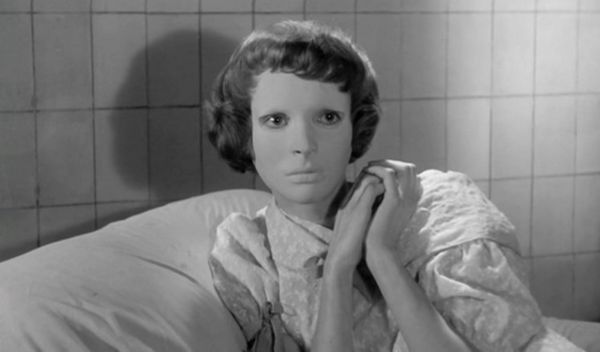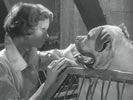Eye For Film >> Movies >> Eyes Without A Face (1960) Film Review

An agitated woman (Alida Valli) drives a car through the rainy darkness, occasionally glancing nervously through the rear-view mirror at the trench-coated figure, face hidden beneath a hat, slumped in the back seat. Stopping at an isolated spot by a river, the woman drags out the body (which we can now see, from the stockinged legs trailing behind, belongs to another woman), and dumps it in the rushing waters.
If this seems like the opening to a conventional noir thriller, then the manic hurdy-gurdy three-step of Maurice Jarre's score – half menacing, half jaunty - that accompanies this sequence is suggestive of something altogether more ineffable and unhinged. Indeed, Georges Franju's Eyes Without A Face ends up occupying uncharted territories somewhere between the gothic horrors of James Whale's Frankenstein (1931), the fairytale lyricism of Jean Cocteau's La Belle et la Bête (1946), and the charnel-house realism of Franju's own abbatoir-set documentary Le Sang Des Bêtes (1949).

The young woman's body, it turns out, was missing a face. Respected physician Dr Génessier (Pierre Brasseur) is summoned from a public lecture that he was giving on organ and tissue transplants to verify whether the corpse is that of his own daughter, who had earlier survived a car accident with horrific facial injuries, only to vanish thereafter.
Gravely, the widower Génessier identifies the body, and leaves, on his way out telling Henri Tessot (René Génin), distraught father of another missing girl, "Strange that I should have to comfort you, for whom some hope yet remains." Paternal grief, however, is not all that has been exchanged here – for even as Génessier leaves the faceless body of the dead girl behind him in the morgue, he goes home to his daughter Christiane (Edith Scob), similarly faceless but still very much alive.
With the help of his 'secretary' Louise (Valli), you see, the good doctor has been abducting girls and attempting to transplant their surgically removed faces to his own daughter – an operation that he has already performed with considerably greater success on his collection of stray dogs, as well as on his wife. If Christiane haunts the country villa like an insubstantial ghost, then her parents are more like vampires, preying upon victims in their quest for "man's greatest new hope... the recapture of physical youth". Such monstrosity must be stopped, but in the end it will not be Inspector Parot (Alexandre Rignault), nor his police colleague (Claude Brasseur), nor Christiane's one-time fiancé (François Guérin), who will bring things to a close, but rather Christiane herself, longing for release from her living tomb.
Génessier cuts something of a Promethean figure. On the one hand he is a pioneer in an area of medicine that could benefit not only his daughter, but all of humankind – but on the other, his motives have more to do with self-aggrandisement, and his dehumanising treatment of his 'donor' patients evokes those very doctors who, a mere two decades before Franju's film was made, were using living concentration camp inmates as the involuntary subjects of their horrific (if groundbreaking) experiments.
In a genre where mad scientists typically strut and cackle, Génessier's unassuming meticulousness makes him a more interesting, truly chilling sociopath, matched only by Raymond Lemorne in George Sluizer's The Vanishing (1988) – right down to the beard. Génessier's ultimate fate is hardly undeserved, and even seems to fit his crimes in a satisfying kind of symmetry – but, in all his blighted hubris, he remains tinged with tragedy to the very end.
Eyes Without A Face plays a game of peekaboo in the presentation of its more macabre ideas, tastefully holding back on revealing Christiane's absent face, but then depicting surgery itself with a detachment that proves almost as shocking as its graphic directness. Franju is carefully slicing along the line where the concrete rigours of modern science intersect with the abstractions of youth, beauty and ephemerality – and so his film, though filled with familiar elements from the thriller and horror genres, is even more haunting for its poetic imagery, lifted from the Freudian world of children's fantasy (and shot in beautiful expressionist monochrome by Eugen Schüfftan).
Génessier may be a scalpel-wielding killer, but it is his ethereal daughter, floating from room to room, with her doe eyes, long Givenchy robes and unsettling mask, who eats her way further into the mind's eye (and gives the film its evocative title).
Much as Génessier is a man ahead of his times (complaining to one woman, "As to the future, Madame, we cannot wait that long"), Franju's film too shows remarkable prescience, so that its themes easily accommodate our own contemporary obsessions with cosmetic surgery (in a new millennium that saw, as recently as 2005, the first actual face transplant successfully performed on a woman in France).
Eyes Without A Face has inspired the song of the same name by Billy Idol, and a deliriously OTT reimagining called Faceless (1988), starring Telly Savalas (still sucking on lollipops as though he never left the set of Kojak) and directed by Europe's most prolific purveyor of subversive schlock, Jess Franco. It is Franju's original, however, that will make itself at home in the darker recesses of your unconscious.
Reviewed on: 18 May 2008

















